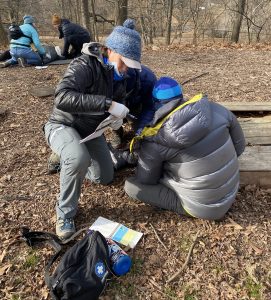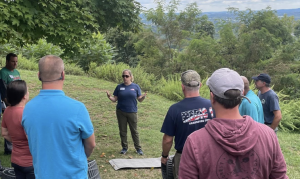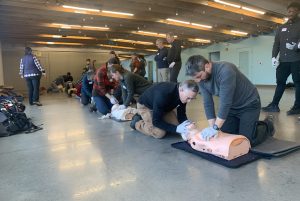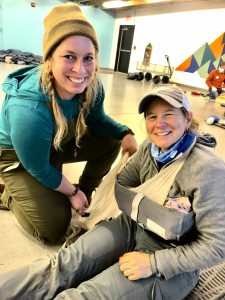Imagine you are leading a group of students on a multi-day backpacking trip deep in the heart of the Appalachian Trail. You’ve spent weeks preparing for this expedition, ensuring an enriching experience for your group. But despite your best efforts, an unexpected medical emergency arises!

A member of your group twists an ankle, or worse, suffers a severe allergic reaction. The nearest hospital or medical facility is hours away, and it’s up to you to take charge of the situation and provide immediate care.
Okay, now take a breath and imagine that same scenario, but instead of feeling overwhelmed and unsure of what to do, you are equipped with the knowledge and skills necessary to handle any medical emergency that might occur, until you can get the patient to definitive care. This is the power of a Wilderness First Responder (WFR) course.
A WFR course differs from a standard front country first aid course because it operates under the assumption that advanced medical care is not immediately accessible. Thus, a WFR course will train you to sustain care for longer periods of time in delayed access environments where there’s an absence of advanced medical equipment.

“The WFR courses specifically are appropriate for those who are outdoor enthusiasts adventuring remotely, for those who are working in austere environments, responding to disaster relief and guiding in the backcountry,” says Tara Cross, owner of Blue Mountain Medic, LLC and lead instructor of the WFR courses that took place at Philadelphia Outward Bound School (POBS) in February. Blue Mountain Medic is a Licensed Training Company of Wilderness Medical Associates International (WMAI).
To connect the dots, it’s important to emphasize why WFR training is relevant under POBS’ outdoor, experiential education lens.
“WMAI’s curriculum is what informs our medical policies and procedures at Outward Bound nationwide,” says Katie Nelson, Director of Program and Safety at POBS. Beyond following procedures, POBS instructors receive thorough training in order to respond to fast-moving, unpredictable environments and medical emergencies that may arise.
Research shows that those who practice what to do during a medical emergency are less likely to panic, and more likely to make sound decisions.

At minimum, a WFR course covers CPR, wound cleaning, dislocation reduction, use of epinephrine for treatment of anaphylaxis and wilderness and environmental topics such as hypothermia, heat exhaustion, frostbite, snake bites, altitude illness, lightning safety, and more. Training is a combination of textbook learning, lectures, and practicing emergency scenarios with classmates.
Oscar Wilde once said, “to expect the unexpected shows a thoroughly modern intellect.” In the wilderness context, training for the unexpected is simply an innate responsibility of guiding a group oftentimes in environments hours away from definitive care.

“Most of what they learn is applicable anywhere,” says Cross, a Physician Assistant whose practiced emergency medicine, orthopedics, and urgent care for 9 years. “As an outdoor leader and educator, many jobs required the training. I’ve always loved the outdoors and been drawn to making sure others are safe and cared for when exploring.”
As a fun aside, Cross has also been EMT trained since 2004; and beginning in 2005, spent several years instructing and course directing for a number of Outward Bound schools, including POBS!
POBS began hosting WFR courses at The Discovery Center in 2020, and has continued to offer one full course and one recertification course each year in early Spring. Courses are open to anyone interested, so keep an eye out for future WFR offerings at POBS this time next year!
Special thanks to Jessica Banks, RN, PHRN, WALS, WEMS. Jessica is an assistant instructor with WMAI who co-instructed the two WFR courses at POBS alongside Tara Cross.
And thank you to all those who’ve participated in these WFR courses at POBS over the years.
